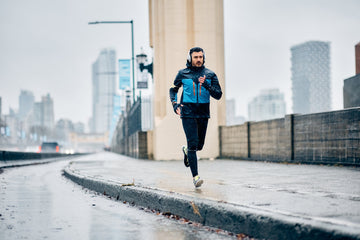Many runners - whether beginners or experienced athletes - know the feeling of heavy legs when running. You start your training, feel motivated, and suddenly your legs feel like they are made of lead. This phenomenon can be frustrating and spoil the fun of running. But don't worry: There are many possible causes for this feeling and just as many solutions to get it under control.
In this post, we'll take a closer look at the most common reasons why legs feel heavy when running and how you can fix the problem so you can run light-footed and full of energy again.
Possible causes for the feeling of heavy legs when running
Overtraining: Too Much of a Good Thing
One of the most common causes of heavy legs is overtraining. If you don't give your body enough recovery time between intense workouts, your muscles will remain under strain and tire more quickly. The result: your muscles will feel tired and exhausted.
Solution : Plan enough rest days into your training plan and ensure a balanced mix of intense and light sessions. Give your muscles the recovery they need.
Insufficient hydration: lack of fluids
Dehydration can also make your legs feel heavy and sluggish. Even a slight lack of water can impair muscle function and reduce your overall well-being while running.
Solution : Drink plenty of water throughout the day and stay well hydrated before and after exercise. During longer runs or in hot temperatures, consider isotonic drinks to help support hydration and electrolyte replenishment.
Poor nutrition: lack of energy
For longer or more intense runs, the body needs energy from carbohydrates. An unbalanced or inadequate diet can affect well-being and endurance when running.
Solution : Make sure you eat enough carbohydrates before running. Whole grains, oatmeal, bananas and sweet potatoes are popular sources of energy. Carb loading before particularly long runs can help increase energy reserves.
Poor circulation: The legs are not optimally supplied
Heavy legs can also be caused by poor circulation. Good circulation promotes the well-being of the muscles and supports performance. Long periods of sitting, for example in the office or when travelling, can affect circulation.
Solution : Make sure you get regular exercise, especially if you sit a lot. Stretching and light leg exercises will help to improve circulation in the legs. Compression stockings can also help to improve the well-being of the legs.
Muscular imbalance: incorrect load
A muscular imbalance occurs when certain muscle groups are used more than others. For example, if you put more strain on your thigh muscles than your calves, an imbalance can occur. This can affect the feeling of running and lead to heavy legs.
Solution : Integrate regular strength training for the leg muscles into your training plan to compensate for muscular imbalances. Exercises such as squats, calf raises and lunges ensure even strengthening of all muscle groups.
Shoes and running technique: Wrong equipment
Wearing unsuitable running shoes or using a less efficient running technique can cause your legs to tire more quickly. Shoes that don't provide enough cushioning or don't suit your running style can affect the running experience.
Solution : Get a running analysis to check your running style and find the right shoes for you. Well-fitting running shoes that suit your foot type can improve the running experience. In addition, pay attention to your running technique and work on running more efficiently.
Iron deficiency: Not enough oxygen for the muscles
Iron deficiency is an often underestimated cause of the feeling of heavy legs, especially in women and endurance athletes. Iron is an important trace element that plays a role in supplying the muscles.
Solution : Have your iron levels checked, especially if you often suffer from heavy legs. Iron-rich foods such as red meat, lentils or spinach can help improve iron intake. In some cases, it may also be necessary to take specific iron supplements - preferably in consultation with your doctor.
Tips to avoid the feeling of heavy legs
• Take regular breaks and stretch : If you sit a lot, get up every 30 minutes, walk around, or do some stretching exercises to stimulate blood circulation.
• Get enough sleep : Make sure you have a regular sleep pattern and get enough rest to provide your muscles with the best possible support.
• Supplement magnesium : A sufficient supply of magnesium through food or supplements can help support muscle well-being.
• Variety in training : Use varied training sessions with different intensities and route profiles to avoid overloading.
• Strength training : Incorporate regular strength training for your leg and core muscles to prepare your legs for running.
Get to the bottom of heavy legs and return light-footed
The feeling of heavy legs can be caused by a variety of factors, from dehydration to overtraining to muscular imbalances. It is important to identify the exact cause in order to address it specifically. With the right measures - such as sufficient rest, hydration, a balanced diet and appropriate training - you can fix the problem and look forward to an easier, pain-free running experience.
Say goodbye to heavy legs and run with ease again – with these tips and exercises for a better running feeling!





